Celebratory Commencement Gives a Glimpse of Brighter Days Ahead
After a challenging year, the Class of 2021 gathered for Commencement
Under picturesque blue skies on a warm, sunny day, most members of the Class of 2021 gathered along with family, friends, staff, and faculty for an in-person Commencement ceremony May 16 in Princeton Stadium. After more than a year of uncertainty created by the pandemic, the ceremony offered a sense of relief and normalcy.
“It honestly still feels very surreal,” said Kamya Yadav ’21, a politics major with a certificate in South Asian studies and a co-chair of Class Day. “I’m so glad I was able to be with my friends and we were all able to sit together in the stadium. I’m sure that it feels very different from if it would have been in front of Nassau Hall, but it actually still felt very grand.”
The milestone was marked by the pandemic as attendees wore masks, graduates were spaced 6 feet apart in white chairs, and the crowd in the stands was sparse to maintain social distance. An estimated 1,100 seniors and 200 graduate students donned black robes with pops of colorful hoods as they assembled on the field. About 3,000 guests were present, according to the University.
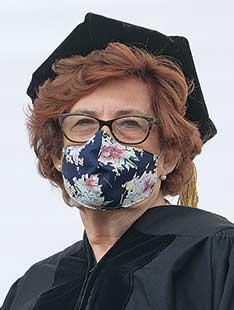
Themes of loss and resilience emerged in the Commencement speeches. President Eisgruber ’83 commended the Class of 2021 for finishing its studies during such a tumultuous time and highlighted lessons learned from the experience in his address, titled “Together, Six Feet Apart.”
“Our long, unwelcome separation teaches us this: To forge a common good together, we must break bread together,” he said. “We must, in other words, relate to one another not just as disembodied intellects, interests, or ideologies, or as faces in Zoom boxes, but also as real, three-dimensional people who share basic needs and a common humanity.”
Valedictorian Taishi Nakase ’21, an operations and financial engineering concentrator, talked about unexpectedly resuming college from his childhood bedroom in Australia, but finding joy in the simple moments shared with his father that would not have happened otherwise.
“Our moments of loneliness, grief, and even private joys ought to be recognized, for they can and should move us,” Nakase said. “Whether we know it or not, we have shared this aloneness together. I don’t want to dwell on the past, but I do want to honor this profound time in our lives when our naive youth was abruptly replaced with a coarse reality filled with both extraordinary loss and ordinary disappointment.”
Salutatorian Lucy Wang ’21, a chemistry concentrator, applauded the class for its triumphs in her address, delivered in Latin. “With courage in our hearts, we have faced the terrors of frozen Zoom and traversed the scorching sands of thesis deadlines,” she said. “Perhaps one day, even these experiences will be a pleasure to remember. Long have we awaited this day, shores dear to behold. My friends, may the glittering stars always guide your journeys!”
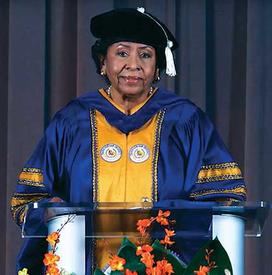
The University awarded degrees to 1,154 undergraduates.
According to Vice President and Secretary Hilary Parker ’01, the committee selecting honorary-degree recipients decided it was “especially meaningful” during the pandemic to honor New Jerseyans who’ve served their communities. Six were chosen: musician and philanthropist Jon Bon Jovi; Linda Caldwell Epps, CEO of 1804 Consultants and educator; John V. Fleming *63, Princeton’s Louis W. Fairchild ’24 Professor of English and Comparative Literature, emeritus; Rush Holt, physicist and eight-term former member of Congress; Dr. Risa Juanita Lavizzo-Mourey, public-health advocate and longtime president of the Robert Wood Johnson Foundation; and Constance Mercer Myers, founder and CEO of HomeFront, an anti-poverty nonprofit in central New Jersey.
In the Baccalaureate and Class Day virtual speeches given earlier in the week, takeaways centered on the topic of diversity. Baccalaureate speaker Ruth J. Simmons, president of Prairie View A&M University and a former Princeton administrator and trustee, talked about the impact acceptance of diversity has had on her life. She encouraged class members to make diversity a regular part of their lives. “Opening our minds to the many ways in which others contribute to advancing our world is just one benefit of a diverse environment, but the greatest benefit of diversity is the way in which such an environment can help us understand how to build mutually respectful and safe communities in which we acknowledge and care for one another through times of trial and adversity,” she said.
Class Day speaker Trevor Noah, comedian and host of The Daily Show, answered questions from the class presented by Yadav, Michael Wang ’21, and Morgan Smith ’21. In response to a question on the impact of comedy, Noah said he sees it as a tool to have difficult conversations. “Comedy on a larger scale for me is also about speaking truth ... . We can talk about some of the more uncomfortable things in society and hopefully poke holes and reveal some of the light that comes through those holes while using comedy to lessen the burden that the audience is feeling,” he said.
In the afternoon following Commencement, 12 students were commissioned as Army officers during an in-person ceremony. Virtual ceremonies were also held for each department in the days surrounding Commencement. On May 22, cultural graduations were held for students identifying as Latino, Middle Eastern and North African (MENA), Asian Pacific Islander Desi American (APIDA), and Pan-African. Other ceremonies were for first-generation and low-income students, and those in the LGBT community.
The University awarded 457 graduate degrees, including 293 Ph.D.s. The graduate school’s virtual Hooding Ceremony was held May 24. Cole Crittenden *05, deputy dean and acting dean of the graduate school, congratulated the advanced-degree recipients and winners of this year’s graduate mentoring awards.
While most students were happy to reconnect with classmates and share this experience on campus, it was not lost on those present that the entire class was not there. Vedika Patwari ’21 was unable to make it back to campus because India went into lockdown after experiencing a second wave of COVID cases in May. She said she was disappointed that things didn’t go as planned, but unpredictability and uncertainty have become hallmarks of the pandemic — she’s used to it, she said. Patwari celebrated with family and connected virtually with Princeton friends.
For those who did experience Commencement in person, the ceremony, the cheers, the photos, the embraces, and the hat tosses — pieces of a typical graduation — signified an end to their years on campus.
“It marked the moment that I felt that we needed,” said Ed Elson ’21, a classics major. “I felt it gave me closure, which I was sort of worried that I wouldn’t be able to really feel.”


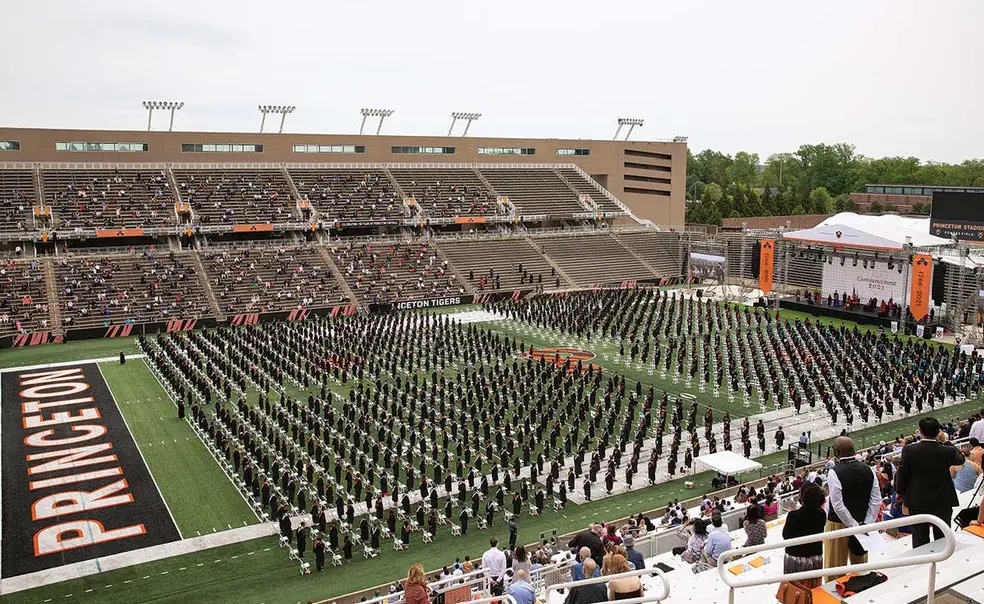
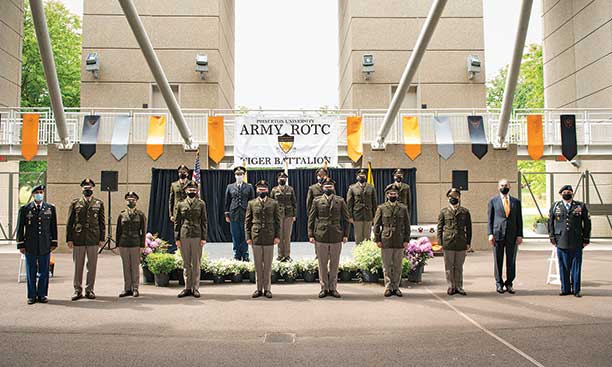
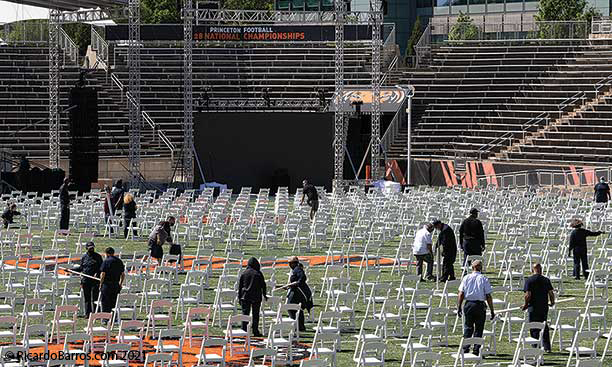







1 Response
Alfred Litwak ’56
4 Years AgoViews of Diversity
In the “President’s Page” in a November 1998 issue of PAW, then President Harold Shapiro *64 told us that “diversity … is fundamental to the long-term excellence of the University.” Speaking from her perspective, this year’s Baccalaureate speaker, a former Princeton administrator, told us that the greatest benefit of diversity is that it helps us build respectful and safe communities. I wonder, can someone tell us, from the current Princeton administration perspective, where “excellence” ranks among the observed benefits of diversity?